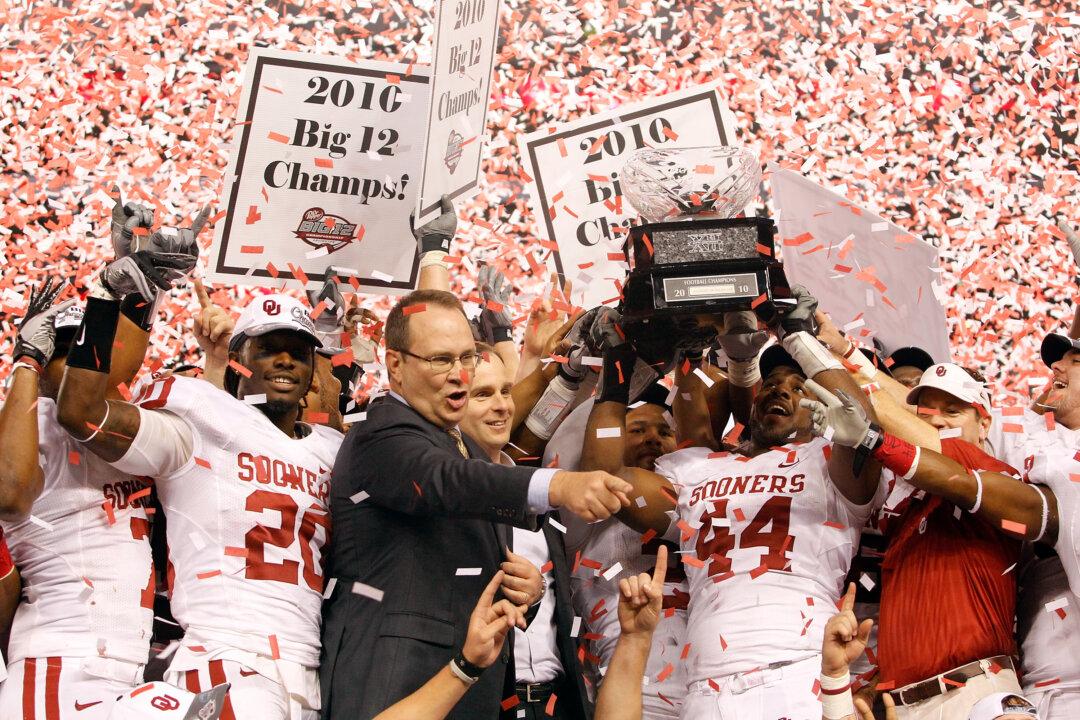The Big 12 finally has its wish. After seeing its membership dwindle to 10 schools a few years ago, the 10-school Power 5 conference was forced to ditch its football championship game because the NCAA only allowed it for leagues with at least 12 members—which is what every other Power 5 conference has.
Now that the NCAA has approved a measure to allow for smaller conferences to hold title games—they can as long as they employ a round-robin schedule—the league hopes it'll put all conferences back on even ground, especially when it comes to deciding the all-important playoff participants.
But the conference is being short-sighted if it thinks another obstacle on the path of a title contender will really give the league a better shot at a championship.
The only thing it guarantees is a bigger payout for each of the schools.
Reportedly the season-ending game is worth roughly $20 million per season, which equates to another $2 million per school. But there’s a price to pay for that bounty.
When the Big 12 started in 1996, the inaugural title game pitted 10–1, third-ranked, two-time defending national champion Nebraska against unranked, 7–4 Texas. What happened? Texas won 37–27, erasing any hope the Cornhuskers had of a rare three-peat.
It’s not the only time the title game tripped up a national contender.
In 1998, Kansas State was 11–0, ranked second in the country, and was ready to play for its first national championship when a 10–2 Texas A&M team came in and beat the Wildcats 36–33, knocking them out of the championship picture. Five years later, Kansas State did the same to undefeated Oklahoma in winning 35–13—though the Sooners somehow still ended up in the title game—and lost to LSU 21–14.
Even having a title game this past season could have easily derailed Oklahoma’s chances of making the playoffs. The first-place Sooners likely would have faced second-place Oklahoma State (which would presumably have won the head-to-head tiebreaker over second-place TCU) in the Big 12 title game.
But the rematch would have taken place just seven days after Oklahoma embarrassed its in-state rival 58–23 in the regular season matchup of top-10 teams. Think the Cowboys would be heavily motivated for revenge seven days later?
Of course that scenario could happen in other conferences as well, but it’s much more likely in the Big 12 where everyone plays everyone—a scenario that is unfeasible in those 12- or 14-team leagues that employ divisions with fewer interconference matchups.
Even in 2014, when the Big 12 was left out of the inaugural playoffs, a title game between co-champions TCU and Baylor wouldn’t have necessarily swayed the committee to include them in the playoffs. After all, SEC-winner Alabama wasn’t going to be left out and neither was undefeated, reigning national champion Florida State.
That would have left Oregon, Ohio State, and the winner of the Big 12 for the two remaining spots. With Ohio State obliterating Wisconsin in the Big Ten championship 59–0 and Oregon throttling Arizona 51–13 in the Pac-12 title game, TCU or Baylor would have likely had to blow out the other to impress the committee enough to include them.
As it turned out, TCU crushed longtime doormat Iowa State 55–3 and Baylor took care of a good Kansas State team in their conference finals and the committee went with Ohio State and Oregon.
So, while the conclusion the leaders of the Big 12 reached was that not having a conference championship game was hurting them in the playoff picture was true for 2014, the only real consistent benefit is the roughly $20 million payout the game is worth on TV.
But beware what you wish for.





